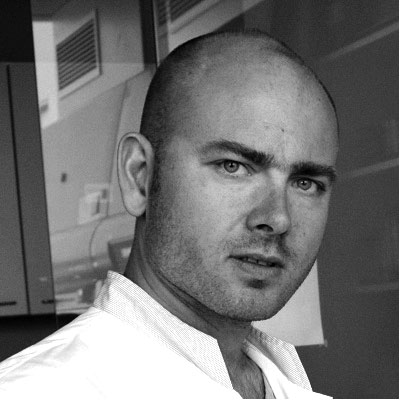 Dr. ir. Ruben Bierings is a principal investigator at the Erasmus MC department of hematology. He is one of the leaders of Work package 12, together with prof. dr. Jeroen Eikenboom. This work package focusses on investigating the endothelial compartment as a potential disease modifier in bleeding disorders.
Dr. ir. Ruben Bierings is a principal investigator at the Erasmus MC department of hematology. He is one of the leaders of Work package 12, together with prof. dr. Jeroen Eikenboom. This work package focusses on investigating the endothelial compartment as a potential disease modifier in bleeding disorders.
(Fun facts:)
- Born: 14 February 1978, Breda
- Living in: Rotterdam
- Education: VWO – Norbertuscollege Roosendaal, Moleculaire Wetenschappen – Wageningen Universiteit
- First job: I had so many jobs that I lost track. One of the first must have been my paper rounds. During the school holidays I also helped my dad in the Endocrinology lab at Internal Medicine in the Dijkzicht Hospital (now Erasmus MC), preparing samples for RIAs and ELISAs.
- Sport / Hobby: Running and in a former life, football.
- Favorite movie: The Shining
- Music instrument: I have zero musical skills, it’s better for everyone if they are kept far away from me.
- First research grant: Gatekeepers of the vasculature; regulation of exocytosis by syntaxin binding proteins (Landsteiner Stichting voor Bloedtransfusie Research)
- What is indispensable?: Our planet
Questions:
What has made you better in your job?
Let’s try it one more time…
How would you define the role of the fundamental WPs in the SYMPHONY consortium?
There is still so much to learn about why patients bleed and what causes the variability in bleeding. For nearly half of the patients with clinical bleeding problems we still cannot tell what causes their bleeding tendency. This tells us we don’t know half of what we should and to improve care for these patients we need to get a grip at the molecular and cellular causes of their disease. The fundamental work packages in SYMPHONY approach this problem by putting the patients center stage using patient-derived cellular models and molecular analysis of patient cells and plasma.
What is for you the Y (why) of SYMPHONY?
I think SYMPHONY is a huge step forward for research into bleeding disorders in the Netherlands. Finally we have people from all disciplines, clinicians, basic and translational scientist, come together with a common goal. Because of this new collaborations are formed, existing collaborations are deepened and we can all learn and benefit from each other’s expertise. This is particularly relevant for the fundamental part of the program where we approach disease mechanisms that underpin bleeding abnormalities in patients in an integrated way. In the labs at LUMC and Erasmus MC we are studying cells from specific patients from the clinical patient cohorts that have been collected at the various hemophilia treatment centers in the Netherlands, while our colleagues at Sanquin study the same patients using pluripotent stem cells or proteomic analysis. To make this possible we first had to sit down with all parties involved to have a look at the requirements when it came to selection, collection and processing of patient samples so that these were compatible with all the specific analyses in the different work packages. Making use of the various expertises available and keeping the interests of a diverse group of collaborators in mind is essential for the success of SYMPHONY. But it will also facilitate future collaborations because it will make it a lot easier to design a new project knowing what your potential partners require to participate. If we do it right, this will leave a legacy that will benefit our scientific community for years to come.
Media tip: can you share a Tedtalk / podcast/ book / …. where you have learned something important?
I learned how to read with Rupsje Nooitgenoeg (The Very Hungry Caterpillar by Eric Carle).
Best music to listen to in the lab?
Headroom, which is a radio show on Studio Brussel that’s on Saturday just before midnight. I often listen them back on Soundcloud. It’s also great music for long runs on a rainy morning.
